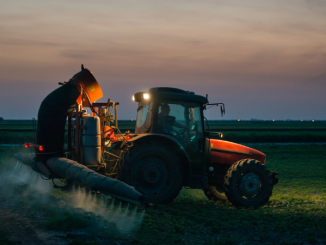
While all eyes this week have been on the nomination of the new crop of Commissioners, there have been plenty of other developments worth watching in Brussels this week. From the EU’s watchdog questioning the Commission over the hasty dismantling of the EU’s green farming measures, to NGOs being ignored for a key direction-setting report on the future of EU policy, Natasha Foote and Oliver Moore bring you up to speed with all you need to know.
Legal wrangle over CAP dismantling dials up a notch
The EU’s watchdog has formally opened an inquiry into the Commission’s conduct in fast-tracking changes to the EU’s farming subsidy programme to dismantle its environmental requirements.
The current CAP took the better part of 4 years to negotiate but was dismantled in a little over 4 weeks, with no impact assessment and without so much as a debate among MEPs (all details here and at link below). The inquiry comes after NGOs’ ClientEarth and BirdLife raised concerns about the amendment of the EU’s agriculture policy back in July 2024.
Green Light Now, Green Fight Later – CAP Fast Track Risks Legal Wrangle
The associations argue that the revision procedure amounted to “maladministration” by the European Commission, including by going against Better Regulations guidelines, and failing to live up to the EU’s legal principles on transparency, consultations and evidence-based decision-making. They also suggested the move was a breach of the Commission’s legal duty under the EU Climate Law by failing to assess the consistency of the CAP reform proposal with climate targets.
As a result, the Ombudsman, Emily O’Reilly, has written to Commission President Ursula von der Leyen asking a series of questions about the procedure, including questions on the consultation process leading up to the decision and how it assessed its obligation under the EU Climate Law, and requesting a meeting. ClientEarth lawyer Sarah Martin called this an “extremely encouraging move by the EU Ombudsman, and indicates that there are indeed democratic questions to probe”.
The Commission has until 16 December to answer the watchdog.
If you want more background on this, ARC2020 has broken down the breakdown of the EU’s green farming measures over the past few years in this re-CAP.
Re-CAP: Breaking down the breakdown of the EU’s green farming measures
Regulatory Scrutiny Board (RSB) – scrutinised by the Ombudsman
The Regulatory Scrutiny Board (RSB), is an independent body within the European Commission to review and issues opinions on Commission draft impact assessments (which accompany legislative proposals). As such, it is central to the Commission’s ‘better regulation‘ agenda.
In response to a March 2023 complaint from Corporate Europe Observatory (CEO) the Ombudsman issued a decision last Friday (13th), it suggested: RSB members should “refrain from meeting with individual interest representatives.” Moreover, the future composition of the RSB should more “clearly correspond to the diversity of the expertise required”, by bringing in social and environmental expertise in some circumstances.
The RSB has some teeth – as stated in the Better Regulation Guiding Principles “Where the RSB issues a negative opinion, the lead DG will have to incorporate the Board’s recommendations into a revised impact assessment report”.
CEO, which brought the complaint, welcomed the findings: “With the RSB set to get an even bigger role under the second von der Leyen Commission, it’s vital that there is a firewall with corporate lobbyists and much more expertise from the social and environmental fields. More broadly, it is long overdue to conduct a wider review of the whole ‘better regulation’ agenda” said Vicky Cann, Corporate Europe Observatory researcher and campaigner.
Draghi report dragged for lack of inclusivity
Billed as a blueprint to rescue the European economy, the publication of former Italian Prime Minister Mario Draghi’s long-awaited report has kept the bubble busy over the past week or so.
A key driving force behind policy decisions for the years to come, the findings of the Draghi report will contribute to the Commission’s work on a new plan for Europe’s “sustainable prosperity and competitiveness”, including the development of the new Clean Industrial Deal for competitive industries and quality jobs, which will be presented in the first 100 days of the new Commission mandate.
It has far-reaching consequences for all EU sectors, paving the way for the EU reorientation from green to clean, with competitiveness being the new name of the game.
But despite its importance for the future direction of EU policy, the list of those consulted for drafting the report, which was released this week, shows a mere 8 NGOs were consulted for the report, 10 times fewer than the 82 companies and groups that were consulted or the 70 trade and business associations.
Moreover, it has emerged that at least 3 of the NGOs listed as consulted – BirdLife Europe, the European Environmental Bureau, and the WWF European Policy Office – were never actually involved in the process of the report’s preparation.
“We regret the lack of structured and transparent stakeholder engagement throughout this process. While Mr. Draghi engaged directly with business representatives, he never engaged with our organisations,” the three NGOs wrote in a joint statement this week. The statement explains that, while one meeting with NGOs did take place, they were not present and therefore the meeting’s occurrence “does not imply endorsement of the report’s findings by our organisations”.
Instead, the three organisations, plus two others – CAN Europe and Transport and Environment – continue to have “serious concerns” around Draghi’s proposed “simplification” agenda, including “worrying deregulation elements” which they say pits climate and environmental goals against one another, for example by granting temporary exemptions to environmental legislation until climate neutrality is reached.
Parliament says no to imported banned pesticides
This week, the European Parliament vetoed a proposed move to allow residues of three EU-banned pesticides in certain imported food and feed products.
Carbendazim, thiophanate-methyl and cyproconazole can no longer be approved in the EU due to their proven harmful effects on human health, including carcinogenicity, reproductive toxicity, and endocrine disruption.
Despite this, there was a motion to allow these three pesticides to be permitted in specific food and feed products to appease trade partners.
For Pesticide Action Network (PAN) Europe, the vote marks a “significant victory for consumers and for EU and non-EU farmers”. “The European Parliament’s veto forces the Commission to ban residues of these three banned pesticides,” Salomé Roynel, Policy Officer at PAN Europe, said, adding that this is a “victory for consumer safety, fair competition for EU farmers, and the health of workers worldwide”.
EU agri ministers meeting
EU agriculture ministers will meet on Monday (23 September) for the second time under the Hungarian Presidency.
On the minister’s menu includes a stocktaking of the second year of implementation of the strategic plans of the Common Agricultural Policy. This is notable given that, so far, the line has been that there has not yet been enough time passed for adequate evaluation.
Now, with one whole implementation cycle complete and controls carried out, there should be “more useful information” on the performance of the plans, as an EU official explained.
The Council will exchange views on the “major challenges” encountered by national authorities in the implementation of the strategic plans of the CAP, as well as identify “possible improvements” to the system, the background briefing states.
If you’d like to dive in yourself, see this page which provides an overview of each country’s plans and a report that analyses all the options chosen by Member States.
They will also exchange views on the market situation, a recurring topic on the Council’s agenda, as well as discuss a number of so-called ‘AOBs’ (another other business) agenda points.
This includes one on reconsidering the ceiling of ‘de minimis’ aid – aka, the amount of state aid that can be given to companies without getting a greenlight from the Commission. This was previously increased from €20,000 to €37,000 over three years, but Germany wants to once again increase this to €50,000.
“The existing ceilings and those revised by the Commission are no longer suitable,” the AOB reads, citing concerns over inflation, plant pests and climate change.
More
An Agrifood Stakeholder’s Guide to the EU’s New Power Structure
CAP Strategic Plans: A European Food and Agricultural Policy for Times of War
Strategic Dialogue on Agriculture – what’s in it, what’s next?
Re-CAP: Breaking down the breakdown of the EU’s green farming measures





